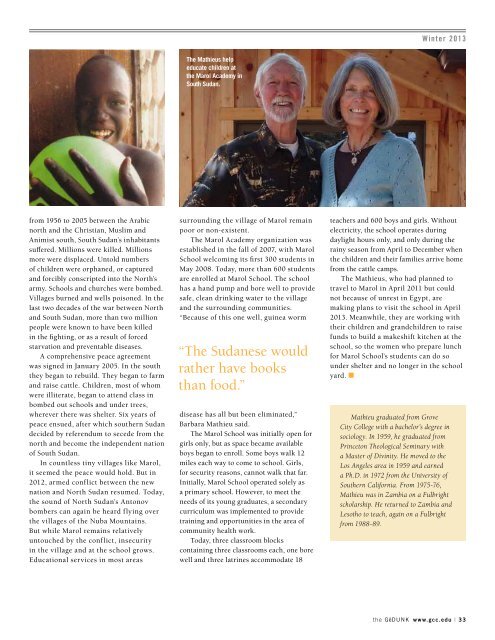Celebrating Life After Work
Celebrating Life After Work - Alumni & Friends - Grove City College
Celebrating Life After Work - Alumni & Friends - Grove City College
You also want an ePaper? Increase the reach of your titles
YUMPU automatically turns print PDFs into web optimized ePapers that Google loves.
Winter 2013<br />
The Mathieus help<br />
educate children at<br />
the Marol Academy in<br />
South Sudan.<br />
from 1956 to 2005 between the Arabic<br />
north and the Christian, Muslim and<br />
Animist south, South Sudan’s inhabitants<br />
suffered. Millions were killed. Millions<br />
more were displaced. Untold numbers<br />
of children were orphaned, or captured<br />
and forcibly conscripted into the North’s<br />
army. Schools and churches were bombed.<br />
Villages burned and wells poisoned. In the<br />
last two decades of the war between North<br />
and South Sudan, more than two million<br />
people were known to have been killed<br />
in the fighting, or as a result of forced<br />
starvation and preventable diseases.<br />
A comprehensive peace agreement<br />
was signed in January 2005. In the south<br />
they began to rebuild. They began to farm<br />
and raise cattle. Children, most of whom<br />
were illiterate, began to attend class in<br />
bombed out schools and under trees,<br />
wherever there was shelter. Six years of<br />
peace ensued, after which southern Sudan<br />
decided by referendum to secede from the<br />
north and become the independent nation<br />
of South Sudan.<br />
In countless tiny villages like Marol,<br />
it seemed the peace would hold. But in<br />
2012, armed conflict between the new<br />
nation and North Sudan resumed. Today,<br />
the sound of North Sudan’s Antonov<br />
bombers can again be heard flying over<br />
the villages of the Nuba Mountains.<br />
But while Marol remains relatively<br />
untouched by the conflict, insecurity<br />
in the village and at the school grows.<br />
Educational services in most areas<br />
surrounding the village of Marol remain<br />
poor or non-existent.<br />
The Marol Academy organization was<br />
established in the fall of 2007, with Marol<br />
School welcoming its first 300 students in<br />
May 2008. Today, more than 600 students<br />
are enrolled at Marol School. The school<br />
has a hand pump and bore well to provide<br />
safe, clean drinking water to the village<br />
and the surrounding communities.<br />
“Because of this one well, guinea worm<br />
“The Sudanese would<br />
rather have books<br />
than food.”<br />
disease has all but been eliminated,”<br />
Barbara Mathieu said.<br />
The Marol School was initially open for<br />
girls only, but as space became available<br />
boys began to enroll. Some boys walk 12<br />
miles each way to come to school. Girls,<br />
for security reasons, cannot walk that far.<br />
Initially, Marol School operated solely as<br />
a primary school. However, to meet the<br />
needs of its young graduates, a secondary<br />
curriculum was implemented to provide<br />
training and opportunities in the area of<br />
community health work.<br />
Today, three classroom blocks<br />
containing three classrooms each, one bore<br />
well and three latrines accommodate 18<br />
teachers and 600 boys and girls. Without<br />
electricity, the school operates during<br />
daylight hours only, and only during the<br />
rainy season from April to December when<br />
the children and their families arrive home<br />
from the cattle camps.<br />
The Mathieus, who had planned to<br />
travel to Marol in April 2011 but could<br />
not because of unrest in Egypt, are<br />
making plans to visit the school in April<br />
2013. Meanwhile, they are working with<br />
their children and grandchildren to raise<br />
funds to build a makeshift kitchen at the<br />
school, so the women who prepare lunch<br />
for Marol School’s students can do so<br />
under shelter and no longer in the school<br />
yard. ■<br />
Mathieu graduated from Grove<br />
City College with a bachelor’s degree in<br />
sociology. In 1959, he graduated from<br />
Princeton Theological Seminary with<br />
a Master of Divinity. He moved to the<br />
Los Angeles area in 1959 and earned<br />
a Ph.D. in 1972 from the University of<br />
Southern California. From 1975-76,<br />
Mathieu was in Zambia on a Fulbright<br />
scholarship. He returned to Zambia and<br />
Lesotho to teach, again on a Fulbright<br />
from 1988-89.<br />
the G ē D U N K www.gcc.edu | 33






